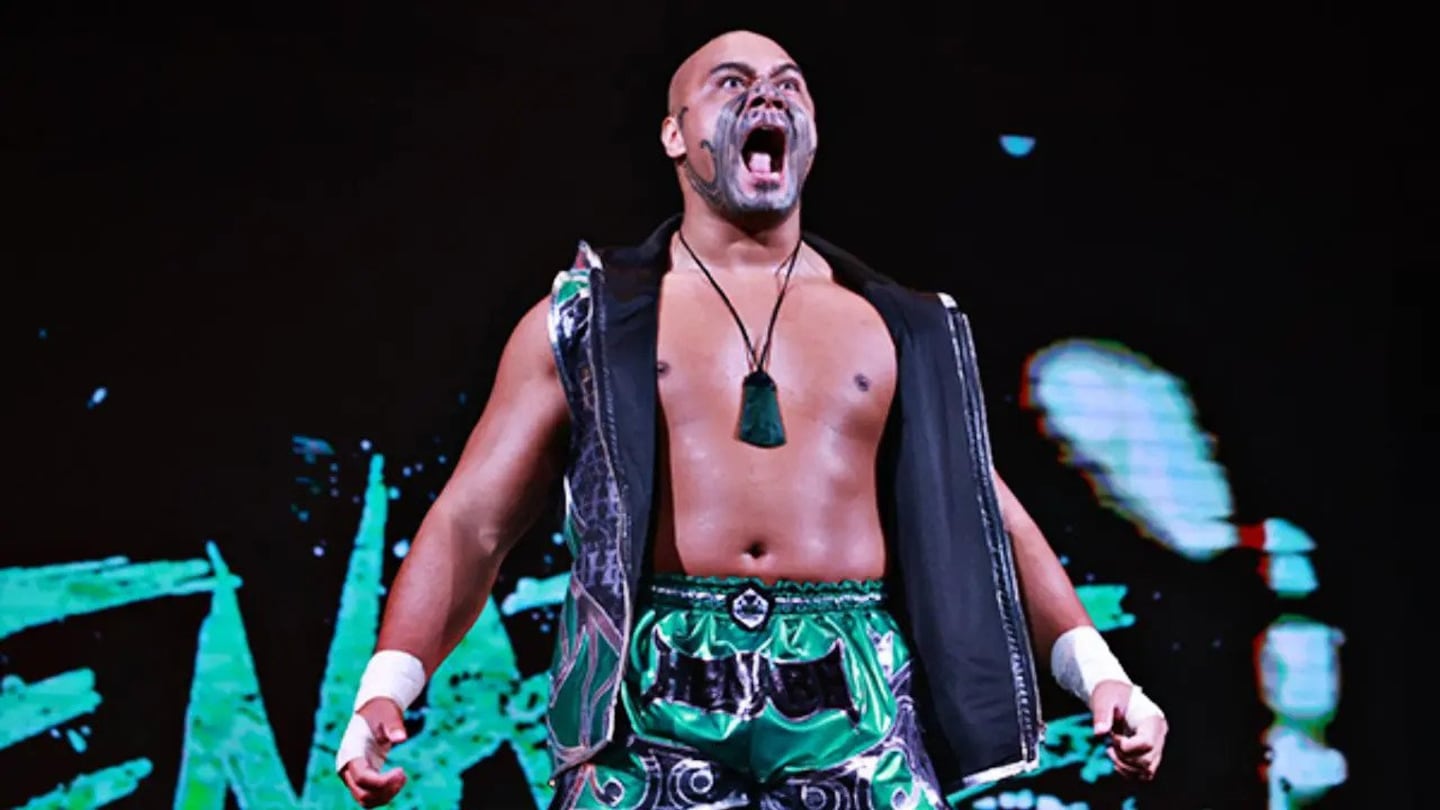“One minute before I walked out, the tears just came. That was the moment it hit me.”
What hit Māori pro-wrestler Aaron Henare (Ngāpuhi, Te Rarawa, Ngāti Kurī, Ngāi Takoto) was pride and gratitude when he made his first appearance in New Japan Pro Wrestling (NJPW), since June, earlier this week with his recently received mataora at home in the Far North.
It’s one thing to reveal it on home soil but to finally bring it to the ‘land of the rising sun’, to a country steeped in tikanga and traditions, and to incorporate it into his passion for wrestling full-time, is quite another.
The moment of realisation of a nearly two-year journey of reconnecting to his taha Māori came in his first match of the G1 Climax tournament. He revealed a new dramatic entrance too, incorporating thrash reo Māori band Alien Weaponry’s Kai Tangata and removing his hood to show the markings of his ancestors to the Japanese crowd and the world.
But tears were flowing, and you can see that he had been crying once the hood was removed. The cry was one of joy.
‘I’m the first’
“[In my head] I knew the responsibility and the power and just before I went out, I fully understood it [in my heart],” he says.
“Maybe the tūpuna were the ones that came down and entered me that day but seeing the red light on the camera it’s like, ‘I’m the first one to do this in a full-time major sport, the first in my bloodline to reveal myself to the world this way.’
“Not only that, there’s still a match, a whole tour to be had. As I said, it’s power, mana, responsibility, all of those things.”
With that reveal comes exposure for te ao Māori to a fanbase of a sport that many might not know about, considering the international reach of professional wrestling.
But the talk about Māori has been mostly positive from Henare’s perspective, especially with NJPW officials, his United Empire group members that he wrestles with, and fans in Japan and around the world embracing it not as a gimmick but as his cultural identity.
“They’re all talking about mataora, about Māori culture, which is buzzy to see because we’re this little island nation at the bottom of the world. You’ve got everyone in Japan, all our fans in America and the UK all talking about [mataora]; ‘Is it real? What does it mean? Why did he do that?’
Tattoo taboo
“That’s cool to me because as wrestling fans maybe it’s the first time they’ve heard about Māori culture... that’s one of the reasons I wanted to [get my mataora]. It was to take our culture to the world.”
Henare’s experience of living in Japan so far with a facial moko has also been positive, he says, considering the Japanese view visible tattoos as taboo. In fact, more Japanese people have inquired about him out of curiosity, and Henare is open to sharing about his moko at any time and discussing differences and similarities.
“It’s like, ‘Wow, this guy is willing to put his whole body on the line to represent his culture.’ That’s something they understand as a people because they’re similar to us in that regard. They call it tamashi, we call it mana. It’s the exact same concept.”
And back home in Aotearoa, Henare’s new look has been acknowledged by many, including those with mataora such as musician Rob Ruha and politician Rawiri Waititi, the latter his inspiration for the belief Māori can be themselves unapologetically.
“He’s someone I look up to because he’s fighting an uphill battle against a whole system that’s designed to subdue him. But every day he turns up, strong face, stoic, happy, singing songs, he’s there every time.
“The way that kids draw inspiration from me, I draw inspiration from [Rawiri].”



